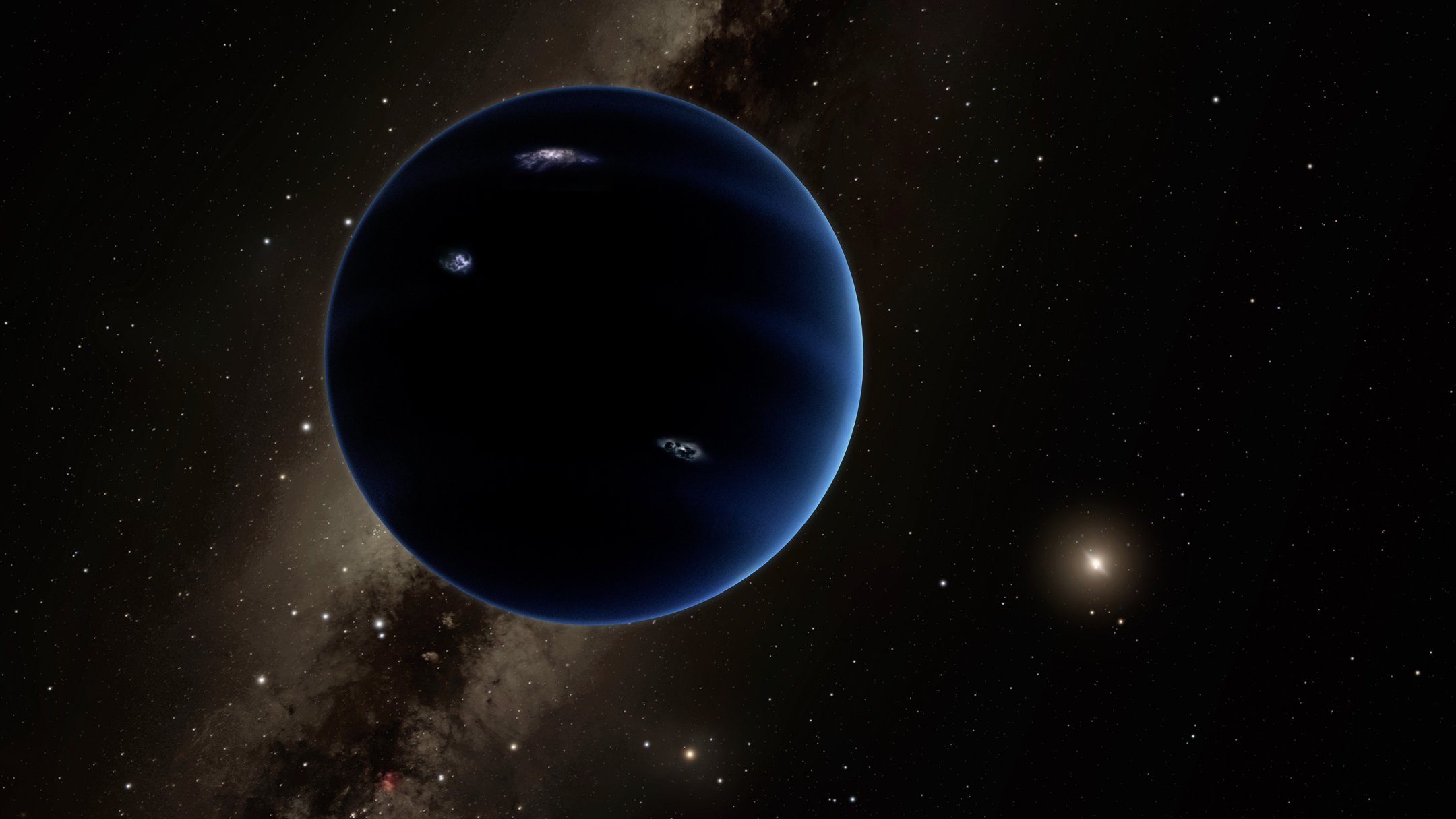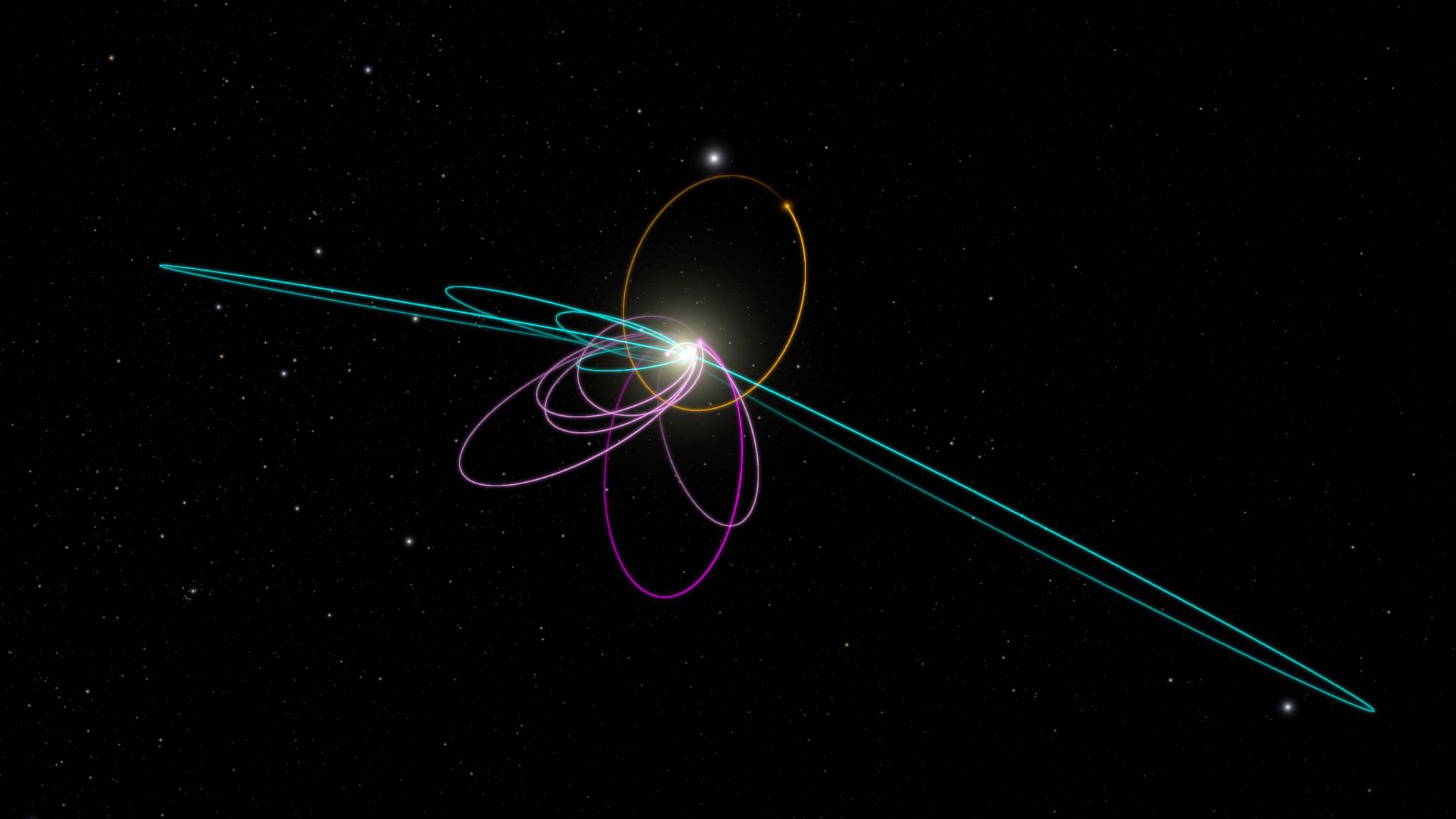Planet Nine probably isn’t a black hole. But it might be worth checking
A pair of physicists think it’s possible that a tiny black hole left over from the universe’s early days lurks in the outer solar system.

An artistic rendering of Planet Nine, a hypothetical massive object that orbits the sun beyond Neptune. Two physicists now think it's possible Planet Nine is actually a primordial black hole. Image Credit: NASA/JPL-Caltech/Robert Hurt
It’s been a little over 13 years since the once-planet Pluto was dethroned. But in the cold, distant reaches of our solar system, there may still lurk a massive body that orbits the sun—one that appears to exert a gravitational tug on some of the small space rocks that lie beyond Neptune.
No one has yet detected the so-called Planet Nine. But if its nicknames are any indication, researchers seem to have a good grip on the nature of this mysterious cosmic object, should it exist at all.
Then again, maybe not. Last week, a pair of physicists proposed an alternate theory in a paper published on the preprint server arXiv: Planet Nine might be less of a planet, and more of a grapefruit-sized black hole.
This possibility, the researchers acknowledge, isn’t terribly likely. But simply entertaining the notion, they argue, could change the way astronomers continue to search for the hypothetical object. “By simply focusing on the concept of a planet, you restrict the experimental search that you’re undertaking,” study author James Unwin of the University of Illinois at Chicago told Ryan F. Mandelbaum at Gizmodo.
If it exists, this candidate black hole is cut from a different cosmic cloth than the ones that form when large stars collapse, or those that form at the centers of galaxies. Rather, it’s thought to be a primordial black hole, born out of one of many tiny but exceptionally dense pockets of matter that formed as the early universe was rapidly expanding, study author Jakub Scholtz, a physicist at Durham University in England, told Rafi Letzter at Live Science.
Primordial black holes are thought to be strewn like ancient debris across the known universe—ubiquitous enough that it’s very possible one found its way into our solar system and became ensnared into orbit around our sun. There’s just one catch: Though there’s indirect evidence primordial black holes are out there, astronomers have yet to find one of these miniature cosmic relics.
Still, the black hole scenario tentatively fits the bill. Planet Nine is thought to be about five to 15 times as massive as Earth, and appears to exert a fair bit of gravitational pull on other objects in its neck of the solar system—boxes that either a planet or a black hole could check.
If Planet Nine is a planet, then it’s probably about the size of Neptune (though scans of the sky haven’t turned up anything of the sort). But if it’s a black hole, it could easily fit in the palm of your hand—something that could help explain its elusiveness. That could invalidate traditional planet-searching techniques, many of which rely on scouring the cosmos with powerful telescopes that operate in the range of visible and infrared light.
To zero in on something that small, astronomers would need to use another source of energy. One option might involve trying to detect the gamma rays emitted by the halo of dark matter that likely shrouds this primordial black hole.
Unwin and Scholtz’s paper hasn’t been published in a peer-reviewed journal yet, and it neither proves nor disproves anything about Planet Nine’s true form. But their proposition isn’t entirely implausible, Konstantin Batygin, an astrophysicist and Planet Nine hunter at Caltech who wasn’t involved in the study, told Mandelbaum. If planet-focused surveys of the sky keep coming back empty-handed, he said, a primordial black hole could be an interesting alternative to pursue.
“The most mundane, or maybe the most sane explanation is that it’s a planet,” Scholtz told Letzter. But “it doesn’t need to be a planet.”
It’s also still possible that neither theory will pan out—and researchers will find that there’s no Planet Nine at all. Nathan Kaib, an astronomer at the University of Oklahoma, contends that there would be more detectable anomalies in the outer solar system if something that massive were actually barreling through it, Letzter reports.
But the search is worth continuing, Unwin and Scholtz argue in their paper—especially given how big the payoff could be. It’s at least worth keeping an open mind.



